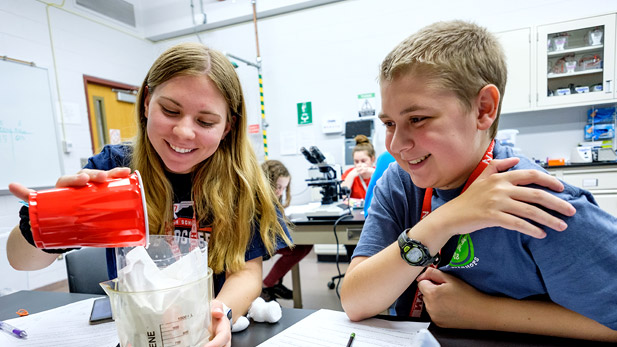Teens Have Summer STEM Fun in New ‘Project SELECT’
Monday, July 08, 2019

The week-long residential Project SELECT summer experience for rising high school juniors complimented Rose-Hulman’s highly successful Operation Catapult STEM education program.
Nearly 40 rising high school juniors from across the country worked together on campus to complete a variety of projects in a new immersive summer program, Project SELECT, for students interested learning and having fun with science, technology, engineering and math (STEM).
Engagement with elements of science and engineering was a key component of the program, according to co-director Christine Buckley, associate professor of biomedical engineering.
“We spent the morning taking principles of science and then applying them in the afternoon to engineering projects that could be applied to address some of the grand challenges of society,” she says.
For instance, student teams dissected a worm in order to place electrodes for measuring the electrical signals produced within the invertebrate animal. Then, the groups took the circuitry of the human body’s muscles to control a small motor that drove a robotic finger. Finally, they programmed an Arduino microprocessor to control the motor to control the finger to pick up an item. All of this covered elements of biology, chemistry, biomedical engineering, electrical engineering and computer programming.
Other projects covered elements of genetics and food science, air quality monitoring, solar technology and biofuels, all under the mentorship of Rose-Hulman professors. Also, students had the opportunity to star gaze on campus at the Oakley Observatory and enjoy several fun-filled social activities.
Project SELECT was modeled in part on Rose-Hulman’s successful Operation Catapult program, in its 52nd summer, for incoming senior-year students. Parents have clamored for this type of program for students in earlier grades.
Engagement with elements of science and engineering was a key component of the program, according to co-director Christine Buckley, associate professor of biomedical engineering.
“We spent the morning taking principles of science and then applying them in the afternoon to engineering projects that could be applied to address some of the grand challenges of society,” she says.
For instance, student teams dissected a worm in order to place electrodes for measuring the electrical signals produced within the invertebrate animal. Then, the groups took the circuitry of the human body’s muscles to control a small motor that drove a robotic finger. Finally, they programmed an Arduino microprocessor to control the motor to control the finger to pick up an item. All of this covered elements of biology, chemistry, biomedical engineering, electrical engineering and computer programming.
Other projects covered elements of genetics and food science, air quality monitoring, solar technology and biofuels, all under the mentorship of Rose-Hulman professors. Also, students had the opportunity to star gaze on campus at the Oakley Observatory and enjoy several fun-filled social activities.
Project SELECT was modeled in part on Rose-Hulman’s successful Operation Catapult program, in its 52nd summer, for incoming senior-year students. Parents have clamored for this type of program for students in earlier grades.